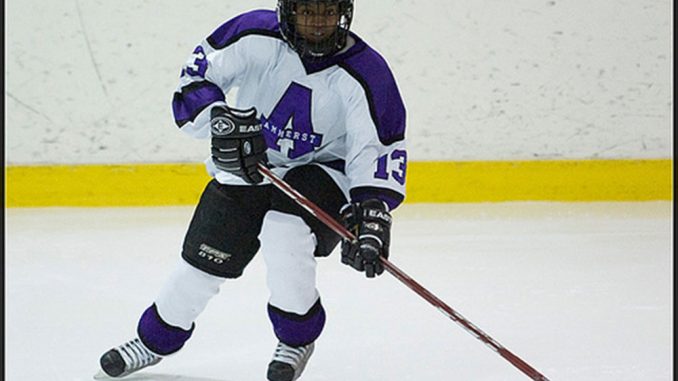
When Tarasai Karega watched “The Mighty Ducks” at 7 years old, it never crossed her mind that it might be considered unusual for her to want to play ice hockey.
The fancy tricks and maneuvers she saw on the screen looked cool – she wanted to learn. Even when she did begin to encounter the stereotype that African-Americans don’t play ice hockey, she didn’t hang up her skates.
The sports business master’s candidate has encountered that stereotype, even from her own extended family at times, since she started playing the sport at age 9. Growing up as one of two African-American girls at a private school in Michigan, Karega was surrounded by other students who played hockey – they just didn’t expect her to have that in common with them.
Despite the challenges she encountered, Karega played hockey throughout her undergraduate education, but her involvement with the industry didn’t stop with being an athlete.
Karega said she believes the sports industry has significant opportunities for young people, something she strives to impress upon the youth of Philadelphia through her past work at Black Women in Sport Foundation and current employment at the Ed Snider Youth Hockey Foundation.
Balancing the pursuit of her master’s degree part-time with her full-time day job, she hopes to become a role model for kids who dream about a career in the industry.
“I think especially in today’s society, we see a lot of kids who see professional athletes on TV and their dream is to become the next Kobe Bryant or the next Lebron James,” Karega said. “It’s definitely not a dream I’m going to shatter – if you want to become a professional athlete, that’s great. I just think sometimes kids miss the steps [between] becoming an amateur and a professional. My job is to help them bridge that gap.”
Karega coaches hockey at the Ed Snider Youth Hockey Foundation. Much like her mentor and the founder of BWSF, Professor Emerita Tina Sloan Green, Karega said she believes physical activity and participation in team activity are invaluable aspects of any child’s education.
Green, the first African-American woman head coach in the history of women’s intercollegiate lacrosse, was Temple’s lacrosse coach from 1973 to 1992. She has been significantly commemorated in the sporting world for her coaching achievements and activism.
It was Green, Karega said, who encouraged her to return to school to pursue a master’s degree. The spark of interest had already been ignited when a family friend, who sits on a board with the owner of the Carolina Hurricanes, suggested Karega could someday even own her own sports team.
The BWSF was formally established in 1992 to encourage and enable women on an intergenerational level to be active and engaged in sport. As Green said, however, the foundation isn’t just about athletic ability.
“There’s a developmental value in sports,” Green said. “We’re not looking to produce champion athletes, we’re interested in producing good people. [We want to give] them reasons to be leaders and stay in school. I think it’s one of the greatest ways to teach the value of diversity. My teams at Temple were always diverse and they had to work together to win.”
Karega hopes to model the foundation’s mentality in her own work. She said she feels she can act as a mentor by showing students interested in pursuing sports professionally that being an athlete isn’t the only option available to them.
“For all the people who want to be professional athletes, there just aren’t enough spots,” Karega said. “That’s where my story comes in – I was a collegiate athlete, I had a lot of success playing ice hockey and I’m still connected with the ice hockey industry and the sports industry with my career and my academic status. A lot of kids don’t know that you can study medicine and be an athletic trainer for a team, or you can study law and help negotiate contracts for athletes.”
In addition, since ice hockey is what Green called “a hard sell to the black community” in many areas due to lack of accessibility and funds, Karega acted as a key advocate for the sport among board members of BWSF and participating students alike.
“She actually was able to really change the opinion of my staff and parents,” Green said. “She was a real trailblazer and change agent.”
Green added that Karega is a “great role model” and anticipates her mentee having success in the sports business world. Though Karega said owning her own sports team is “definitely something I’d want to look into,” she currently aspires to break into the field of corporate partnerships for teams.
Erin Edinger-Turoff can be reached at erin.edinger-turoff@temple.edu or on Twitter @erinJustineET.



Be the first to comment